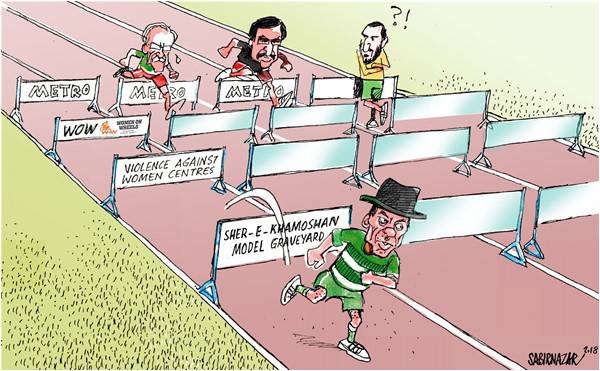
Insecurities of an officer
Madam,
The insecurity of officers of the armed forces and the judiciary is understandable. However, we must also seek to understand what the source of this insecurity could be.
Take the structure of three big major public sector organisations, the army, the judiciary and the bureaucracy. All three have explicitly defined rules of conduct which govern promotions, perks and privileges, punishments and the terms of job security. The strictest code is for the armed forces, followed by the bureaucracy and the judiciary.
In practice, however, whenever someone breaks these rules, steps are taken to stop the knowledge of the violation from spreading. As a result of this, most public sector employees feel confident that their organisation was, by and large, running under defined rules.
However, a problem has recently arisen with the introduction of instant messengers and photo sharing technology the information about the smallest violations becomes widely known in a matter of minutes.
Do remember that nothing shakes the confidence of employees more than the knowledge that their colleagues are violating rules. One starts feeling insecure about his job, his right to promotion, perks and privileges. It also must be remembered that since the implementation of rules of conduct in these organizations is top-down and there is no bottom-up correction system, the employee is left at a loose end. Since speaking up against one’s own organization is likened to treachery, he rages against other systems which may have caused the collapse of his organisation. If he is the political type, he turns to a political party for salvation. If he is the religious type, he turns towards religious extremism.
All three organisations are victims, but the worst-hit is the armed forces because of its strict rules of conduct. Any information of violation of codes causes severe discontentment.
For example, while a house was already guaranteed to every defence officer, lately under a policy, officers are entitled to plots in the Defence Housing Authorities (DHAs) corresponding with their ranks; one plot to each major, two for lieutenant colonels, three for colonels, four for brigadiers, five to six for major general and higher numbers for higher ranks. So far so good.
The problem is that except for the guaranteed house, he can get these plots only after completion of extended service. Here arises the problem: information technology is giving him information which is causing him unbearable discontentment, but he must acquiesce to get the plot. Nothing is more distressing than this.
One information, which affects specifically the retired defence officers, is post-retirement employment. Mostly officers retire between 45 and 52 years of age and therefore, must be reemployed. However, about 10 per cent find work, that too, in a most topsy-turvy manner. Blue–eyed get re-employment while the deserving are left out. Nowhere have I found more discontentment than in this cadre.
Brigadier (r) Khalid Pervez Nadeem,
Lahore.

Poor performance
Madam,
I was very disappointed to the watch poor performance of Lahore Qalanders which collapsed against a deadly bowling attack by Multan Sultans in a match played on February 23. I was further dismayed to watch their against Quetta Gladiators February 24.
Since I hail from Lahore, I always support a team from my city but unfortunately, Lahore Qalanders have not performed very well ever since the Pakistan Super League was launched in 2015. I am sure the sponsors and the management of the team are trying their best to improve its performance and make it a trophy-winning team. Even the induction of big names like Aqib Javed Akhtar and Shoab Akhtar has not helped Lahore Qalanders.
Ejaz Ahmad Magoon,
Dubai.
Etisalat owes Pakistan $800 million
Madam,
Privatisation is supposed to boost state revenues, which can only be achieved when the deal is transparent, properly audited and public office holders involved in executing the deal are not hostage to various conflicts of interest. In the absence of these, cases like the privatisation of Pakistan Telecommunication Company Limited (PTCL) happen.
Etisalat International, a company owned in the United Arab Emirates, owes Pakistan $800 million as balance of total bid amount of USD2.598 for 26 percent shares of PTCL. This bidding took place in June 2005. Surprisingly. in January 2006, EI requested for certain modifications to the transaction’s structure, which were approved by former prime minister Shaukat Aziz with consent of General (r) Pervez Musharraf on April 12, 2006, giving them the option of staggered payments, cost of Voluntary Separation Scheme and 3,248 properties with clean and clear titles. As usual, no proper evaluation was carried out about the prevailing market price of these expensive properties. The EI has paid only $1.799 million and the pending amount is $799.3 million.
As many as 3,215 properties have been transferred to the EI. Pakistan has evaluated the remaining 33 properties at $87.89 million, while the EI at $125 million. All major public office holders involved on behalf of Pakistan, without any exception, either held foreign nationalities or Iqamas. They live abroad and some are employed in the UAE.
Former PM Shaukat Aziz has never returned to Pakistan, while Musharraf lives in Dubai. Former finance minister Hafeez Sheikh is also employed there. This is what happens when public office holders possess foreign passports, a green card or an Iqama, which is basically a work permit facilitating the opening of a bank account.
When Ishaq Dar was finance minister, he went around the world floating bonds and seeking loans but never once did he make an effort to retrieve the $800 million owed to Pakistan.
Malik Tariq Ali,
Lahore.

